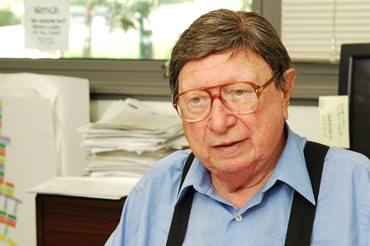
As habitués of the Science League of America may have by now gathered, I have a taste for historical trivia and for unusual words. A few months ago, a member of NCSE offered me the chance to indulge both by asking,
I remembered that someone from the creationist side used the word “astrophysicism” in court or in a legislature, and I’ve tracked it down, but not closely enough. According to The Creation Controversy by Dorothy Nelkin, p. 140, it was used in December 1981 in Rev. Bill McLean et al. v. the Arkansas Board of Education et al. trial. Her footnote is that she was there as an expert witness and heard it. But I don’t know who said it, and what the context was. To the best of my recollection, a scientist said he or she was not an astrophysicist, and his or her questioner said something like, “Surely you know something about astrophysicism.”
What is “astrophysicism”? A Google search turns up no definitions. Even more damning, the word does not appear in the twin authorities of acceptable English, the Oxford English Dictionary and the official Scrabble dictionary. (OWL2, not SOWPODS.)
To remind you, McLean v. Arkansas was the lawsuit challenging the constitutionality of Arkansas’s Balanced Treatment for Creation Science and Evolution Science Act of 1981. Like Kitzmiller v. Dover, it took place in a federal district court and was never appealed, but was nevertheless influential on later rulings about the constitutionality of teaching creationism. And like Kitzmiller v. Dover—and unlike, say, Epperson v. Arkansas and Edwards v. Aguillard—it featured a full panoply of expert witnesses, including, for the plaintiffs, Francisco J. Ayala, Brent Dalrymple, and Stephen Jay Gould, as well as Nelkin, and, for the defendants, Norman Geisler, Robert V. Gentry, and Chandra Wickramasinghe (although disappointingly not—as I mentioned in “In the Orbit of McLean”—the geocentrist Gerardus D. Bouw). The clash of such witnesses attracts journalists, and there’s a wealth of reports about the McLean trial in general. About “astrophysicism,” though, the record is not forthcoming.
The exception is Niles Eldredge’s The Triumph of Evolution (2001), which discloses that Harold Morowitz (shown above), then a biophysicist at Yale University, was indeed solicited for his opinion on “astrophysicism” during the trial:
The fourth member of the attorney’s general staff, blatantly ignorant yet doggedly determined to shake, if not break, the placid professor, was hammering away on the second law of thermodynamics. Morowitz, who had already testified in great detail on the thermodynamics of biological systems, calmly and repeatedly replied that his expertise lies in biophysics and that he could not comment on the work of astrophysicists. Undeterred, the lawyer pressed Morowitz to admit that he surely must have some opinion on “astrophysicism.”
The word “astrophysicism” appears in Google Books only in Eldredge’s and Nelkin’s books in their respective discussions of the McLean case. Puzzlingly, though, it’s unclear whether it appeared in the McLean courtroom.
There’s only a partial transcript of the trial, available on-line at the invaluable McLean v. Arkansas Documentation Project, but it includes Morowitz’s cross examination by Assistant Attorney General Dallas Childs, which followed (after a break for lunch) Stephen Jay Gould’s testimony. Here’s the relevant part of the cross examination (which follows the 602 mark in the linked page):
Q: What is your position as to whether or not the solar system, the planets around our sun, is an equilibrium or non-equilibrium state?
A: The solar system is in a non-equilibrium state.
Q: And what about the universe?
A: That is a question in astrophysics that goes beyond my area of expertise. That has to do with whether the universe is closed or open.
Q: Are there legitimate reputable scientist[s] who believe the universe is a closed system?
A: That goes beyond my area of expertise.
Q: I am not asking you to testify within your area of expertise. I am asking you if you know of your own personal knowledge whether there are reputable scientists in the field who postulate that the universe is a closed system.
A: I am not really equipped to evaluate astrophysicists with respect to their competence.
Q: Is there controversy in that field in that area?
A: I believe there are astrophysicists who hold the view that the universe is open, and there are astrophysicists who hold the view that it is a closed universe, yes.
Q: Of the astrophysicists who hold the view the universe is the closed system, do you know whether or not they are creation scientists?
A: I do not.
It would be difficult now to discover whether Childs said “astrophysicism” (and the court reporter mistranscribed it or revised the record afterward) or not (but Nelkin and Eldredge misheard him as saying it). But I lean toward the former hypothesis, since Eldredge’s book provides details not to be found in Nelkin’s book, suggesting that they experienced and remembered the incident independently.
Even if Childs did say “astrophysicism,” of course, it’s not clear what it would show. True, Childs was not a scientist, and his grasp on the relevant science seems to have been tenuous. In his Creationism on Trial: Evolution and God at Little Rock (1985), the theologian Langdon Gilkey, who also testified for the plaintiffs, wasn’t impressed with Childs’s cross examination of Morowitz on the scientific issues. “Childs was, however, no fool,” Gilkey added, adducing his line of questioning about whether the scientific community was really, as claimed, open in principle to considering unorthodox ideas such as those of creation science: “This was by no means an ineffective or invalid argument.” Nelkin and Eldredge both mention the use of the word “astrophysicism” with minimal comment but in such a way as to imply that it reflected a comical degree of ignorance or pretension on the assistant attorney general’s part, which seems uncharitable for what might have been, after all, a mere slip of the tongue.

